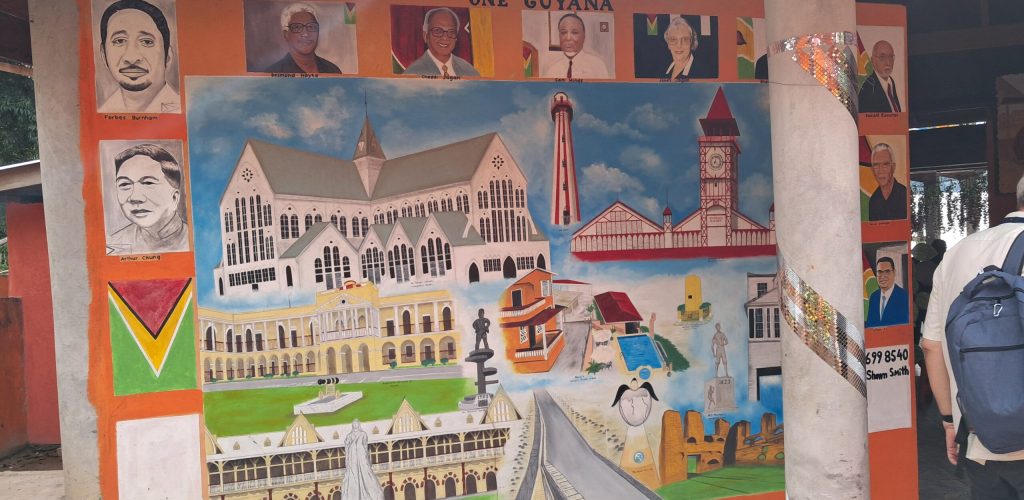Author: Tandacia Gentle, Medical Social Worker
Guyana is located on the northern coast of South America, bordering Brazil to the south, Venezuela to the west, Suriname to the east, and the Atlantic Ocean to the north. It is the only South American nation that speaks English. Rivers, savannahs, and tropical rainforests cover a large portion of the nation, which is known as the «land of many waters.”
The population is about 800,000, a very small number considering the size of the country. People with East Indian, African, Indigenous (Amerindian), European, and Chinese ancestry are examples of ethnic diversity. Islam, Christianity, Hinduism, and Indigenous beliefs are among the religions. The music, dance, cuisine, and festivals all showcase the fusion of South American and Caribbean customs.
Guyana offers a valuable setting for comprehending social processes and human behavior because of its distinctive fusion of cultural diversity and changing socioeconomic landscape. The necessity of successful social intervention and advocacy has been highlighted by the country’s persistent problems, which include poverty, intimate partner violence, neglect of children, and limited access to social and mental health services. These facts have influenced my interest in social work both academically and professionally, and they have inspired me to contribute to Guyana’s efforts to establish evidence-based practices that support social justice, empowerment, and long-term community well-being.
In order to promote social transformation, social growth, cohesion, empowerment, and people’s liberty, social work is a practice-based profession and academic field. Human rights, respect for diversity, social justice, and collaboration with both individuals and larger systems are important pillars.
The role of social workers in Guyana is multifaceted. Their primary responsibilities include helping vulnerable groups, such as children, the elderly, those living in distant locations, those suffering from mental health disorders, victims of abuse, etc. Encouraging equality, social justice, and human dignity while ensuring that no one is «left behind.» Cooperating with neighborhood groups, non-profits, and government departments (such as the Ministry for Human Services and Social Security). Crisis intervention includes helping families in need and dealing with issues of mental health, child welfare, and domestic abuse. Sounds quite simple, right? Unfortunately, the reality is far more complex. Let me show you what I mean through a real case.
Imagine being abused for years, and when you finally gather the courage to speak out, the perpetrator fabricates lies, claiming that you were the abuser. Instead of receiving the justice you desperately need, you now find yourself facing a physical assault charge. Let’s examine this case.
My client, a 32-year-old woman who lives on the West Bank of Demerara, Guyana, will be referred to as «Ms. J.» We shall refer to her partner, a 35-year-old male working in the construction industry, as «Mr. A.» They have lived together with their two children (ages two and ten) for seven years. According to Ms. J, her partner, Mr. A, has abused her physically, emotionally, and psychologically for several years. Financial hardship and Mr. A’s frequent alcohol usage are said to have contributed to the abuse’s worsening. Multiple instances of slapping, verbal threats, intimidation, and forced separation from her family members are detailed by Ms. J.
Ms. J sought help from the police after a particularly serious incident in which she was visibly injured. However, after an investigation, Mr. A claimed that Ms. J was the abuser, saying that she had destroyed property and attacked him with a household object. A court decision is still pending on the bodily assault charges brought against both parties under the Family Violence Act (2024). This example illustrates a larger cultural norm that exists in some Guyanese communities, where stigma, economic reliance, and fear of social judgment frequently deter victims, especially women from reporting abuse. Furthermore, offenders may use victimhood as a ruse to influence the system, which could cause misunderstandings in the reactions of social services and the legal system. Intervention efforts become even more difficult when shelters and psychological assistance are not readily available.
While we’re on cultural norms, consider the fact where some mothers encourage their daughters to remain in abusive relationships simply because the abuser is providing financial support to the household. Leaving, in these cases, often means “having to struggle with the children”, as the current system offers limited support for single mothers. This is the struggle and painful reality for many women in Guyana. Too often, those who choose to leave end up facing immense hardships, working long hours and carrying heavy burdens alone to care for their children.
Despite Guyana’s progressive laws, such as the Family Violence Act (2024), and frameworks that address gender-based violence, many women still face a terrible reality. To guarantee that survivors are not only legally protected but also supported in practice, a more robust collective legal, social, and cultural response is required. In examining this case, several key areas for systemic improvement become evident. The need for improved interagency cooperation, improved training for law enforcement to identify power dynamics in domestic abuse situations, and the development of gender-sensitive procedures for managing cross-allegations are all highlighted by this case. The significance of advocacy and survivor empowerment is also emphasized, especially for women who are silenced by cultural and societal norms and encounter systemic obstacles to obtaining justice. When requesting assistance, women frequently encounter stigma, financial dependence, and fear of reprisals. Although the legal structure is strong, there are still significant issues with knowledge, enforcement, and support services.

